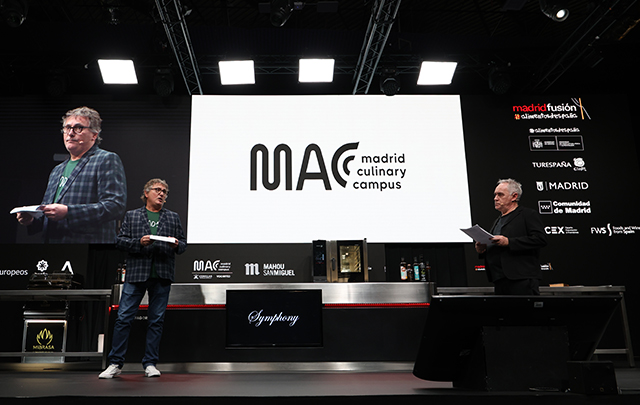News
Adrià and Aduriz cook up a revolution in culinary education

These two chefs are at the heart of the Madrid Culinary Campus, an ambitious educational project promoted by Vocento and the University of Comillas
To unravel the future of cuisine, you have to know its past, and ask yourself an infinite number of questions. This is what two of the best equipped minds in our gastronomy, the brilliant Ferran Adrià and Andoni Luis Aduriz, have done at Madrid Fusion Food of Spain. The creators of elBulli and Mugaritz will be the soul of the Madrid Culinary Campus (MACC), the most ambitious educational project in Spanish gastronomy, with two of the most creative and pragmatic minds in the world of cuisine, regular lecturers at Harvard and MIT.
Management is the key word for Adrià, who was much more concerned with economics than creativity when teaching how to run a restaurant. "Cooking is much more than putting together a dish. It is about connecting with other minds, maintaining a business, and innovating", Aduriz said.
They will apply it at the Madrid Culinary Campus, the new university dedicated to gastronomy in all its aspects - cooking, agronomy, and management - born with the vocation of becoming an international benchmark, with Adrià's Sapiens method and Aduriz as a mentor in innovation. Promoted by Vocento and the University of Comillas, the first class has already started. Its students are learning to cook, to understand food production, and to master the rules of entrepreneurship and business management.
"We represent a worldwide movement that has changed the face of cooking. And we can't say it clearly", laments Adrià, who wants to know "what educational centres should be like in 2024, and not just the MACC". "It has to be a thinking centre. It has to be brave and experimental, like us. We have many faults, but if we were anything, we were brave", he boasted.
Adrià, who was a professor at Harvard for eight years, is clear that his presence has "changed university teaching". "It's not pretentious. We must value what we have done, and do it without shame, recognising that the relationship with science was born in Spain. We are such Quixotes that it's the shit. It is not pretentious to claim what we have done. We have to appreciate it. The MACC is a worldwide project, a project based on quality, and we have to say what we have done before to be able to do that", he said.
"We have to learn from the past in order to move forward. If I don't know the past, I can't move forward, and I can't manipulate", he insisted. "I have a lot of respect for people who have worked in the past, because we did not invent the kitchen".
Management
Is there any point in teaching how to chop onions, or bone a steak, at a gastronomic university? Adrià believes that this knowledge is fundamental, but we need to go much further, "and we are going to do it with a technology we have been working on for years, which we call Sapiens", he reiterated. "Management, management, management, management, management. That is the key to everything", he repeated, before presenting a worrying set of figures: "50% of restaurants in Spain barely last five years. Management is fundamental. The other thing is very simple. Only 1% of Spaniards spend more than seventy euros eating out. Between fifteen and thirty euros, it is 25%".
"There are about seven million restaurants in the world. Seventy thousand of them are in Spain, along with more than 200,000 bars. Of the 70,000 restaurants, there are 1,300 recommended restaurants, and 2,600 excellent restaurants in the Michelin guide. But to earn 200,000 euros gross, you need to have two million of revenue", he calculates. "You have to know that the most profitable restaurants you can open are pasta, rice, pizzerias, and steakhouses. The average profitability of a two Michelin star restaurant in Spain is 4%. People think you are a maraja, but you have to tell them that a gastronomic restaurant gives what it gives", says Adrià in his exercise in pragmatism.
Genius and creativity is the motto of the MACC, "the project we would have liked to have studied; a unique opportunity", says Aduriz, a chef who first set foot in elBulli 31 years ago. "It was something extraordinary in the way I thought. It opened my eyes and changed my life", he admits.
"We are living in a moment as exciting as the 80s and 90s", says Aduriz, for whom "the most important thing for progress is connections". "We went to MIT to help scientists develop a technique for the rapid production of elastic spheres, which is now used for both large domes and aircraft counters. We have acquired a lot of knowledge over the last thirty years and we need to pass it on", he concludes.






















































